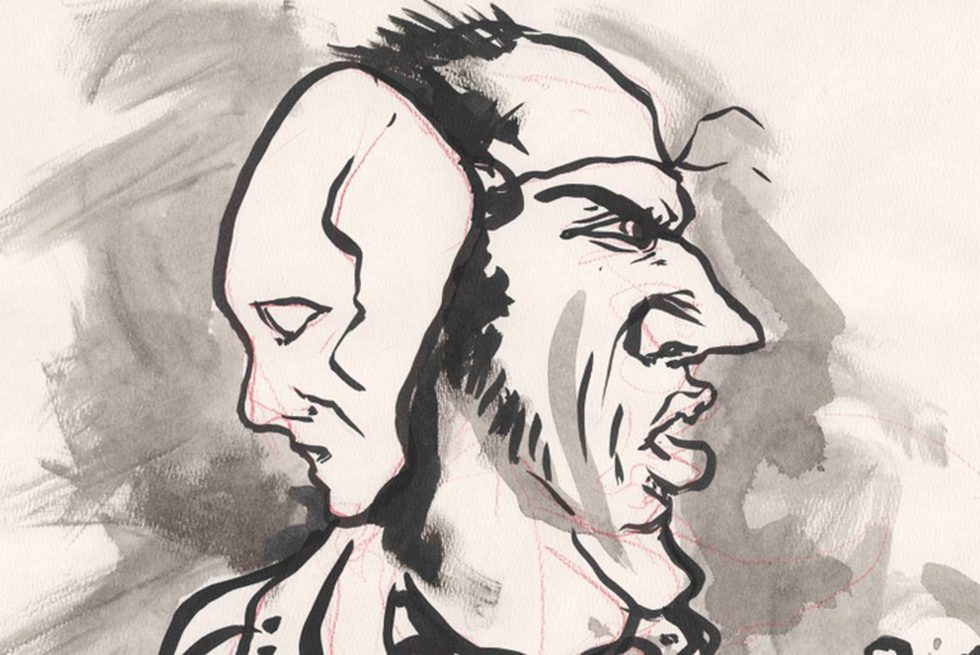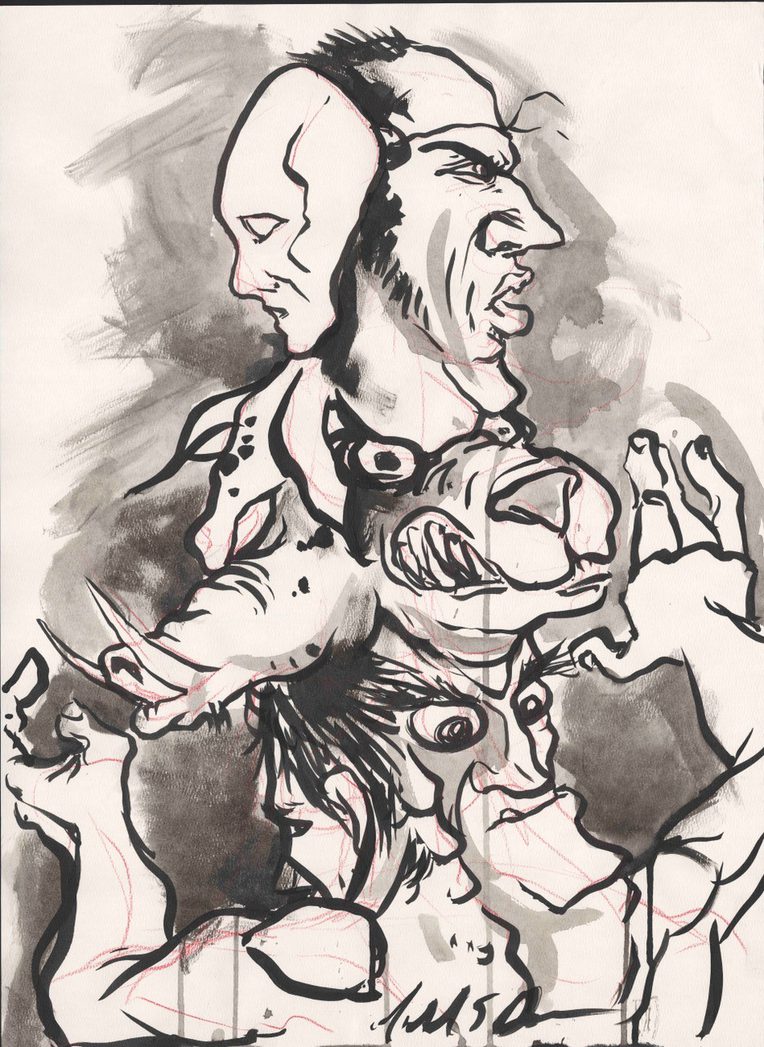Inquisitorial Reason
From the Series: Time of Monsters
From the Series: Time of Monsters

Recent reports note that Steve Bannon (now post–Donald Trump and post-Breitbart) is setting up a think tank in Brussels, from which he plans to boost the European Far Right. Preceding this move was Bannon’s much longer cultivation of ties to some of the Vatican’s darkest conservative figures—notably Cardinal Burke, leader of the Catholic Church’s conservative wing, who is known for his love for lace-embroidered robes, his obsession with the sanctity of marriage, and his belligerent stance toward Islam and feminism. Bannon had previously also placed a defrocked priest, Thomas Williams, into the position of Breitbart’s Rome correspondent. Williams had left the priesthood after he fathered an illegitimate child with the daughter of Mary Ann Glendon, Harvard professor and former U.S. ambassador to the Vatican, who was also president of the Vatican’s Pontifical Academy of the Social Sciences.

Suddenly, the monstrosity of Bannon took on vaster, more nefarious proportions: a Dan Brown novel come to life. With one and a half billion followers, the Catholic Church is the largest and one of the oldest global institutions whose doctrine has barely changed in nearly two millennia. Was Bannon just a node in a larger transnational network stretching out from the dark recesses of the Church’s belly, a lair of patriarchal power and dogma now increasingly entangled with the global Far Right? Was Bannon merely a symptom in a much longer battle within the Church, one that pits orthodoxy against heresy, immutable dogma against shifting circumstances?
The monster I paint here rises out of the muck of these recent developments—the emerging ties between the U.S. and European Far Right and their entanglements with some traditionalist branches of the Church. I call this monster Inquisitorial Reason. The term monster derives from the Latin monstrum, which in turn is rooted in monere: to instruct and warn. Inquisitorial Reason should thus serve as a warning that we are not dealing with a singular creature or institution, but a style of reasoning best termed inquisitional. Its aims are multiple and it aims to multiply, distributing a form of violently paranoid thought that insists on disambiguating dogma from lies, Europe from Islam, sex from gender, the natural family from disorder, and a putatively enlightened capitalism from its evil iterations. The case of contemporary Catholicism is instructive here.
In 2017, Pope Francis (who carries his own bags, settles his own bills, washes the feet of Muslims, and says of gay people “who am I to judge?”) received a so-called filial correction from sixty-two disaffected Catholics who accused him of heretical teachings, of preaching “strange doctrines” that “mislead the flock” through “confusion and error.” Francis here suffered a fate reminiscent of the Little Franciscans, declared heretics in 1296 because of their critique of the Church—with heresy understood, in Aquinas’s terms, as “a species of infidelity in men who, having professed the faith of Christ, in fact corrupt its dogmas.” Heresy, in short, is a form of trickery and deceit, whereby that which is said is not what is meant, where seemingly benign utterances hide Satanic meanings. Inquisitorial Reason is thus, by definition, paranoid: nothing is what it seems. Hungary’s far right Secretary of State for Energy, András Aradszki, is exemplary of this inquisitorial style of paranoid thought. For him, Satan most clearly reveals himself in the use of “deceptive catch-phrases about humane treatment and the love for one’s neighbor,” especially when it comes to the question of refugees in Europe today.
Inquisitorial Reason is also, by definition, antirelativist and anticircumstantial. The filial correction’s bone of contention was footnote 315 in a 2016 Papal encyclical, Amoris Laetitia, in which Pope Francis opened up the possibility for some divorced and remarried Catholics to receive communion. This heresy, the letter stated, amounted to an “ethics of circumstance” that confuses the timeless truths of the Church. As Francis put it in the Encyclical: “It is true that general rules set forth a good which can never be disregarded or neglected, but in their formulation they cannot provide absolutely for all particular situations.” The Guardian reported that such statements have caused almost a quarter of the College of Cardinals, the most senior clergy in the Church, to believe that the Pope is flirting with heresy. As one priest put it: “We all can’t wait for him to die.”
The ethic of circumstance, open to the particular and situated and thus to the full indeterminacy of life, is diametrically opposed to the inquisitional style of reasoning that we see emboldened today. In 2014, Bannon gave a speech in Rome at the Human Dignity Institute, a secretive Catholic organization that seeks to influence the European Parliament and has fourteen cardinals sit on its board (Cardinal Burke serves as the advisory board’s president). In his speech, Bannon preached a mystical apocalyptic geopolitics and urged for a holy war to be fought by what he termed “church militants” on two major fronts. The first is what he calls a “jihadist Islamist fascism” with which the Judeo-Christian West is finding itself to be at war. Such paranoid fantasies of an Islamic cancer are buttressed by figures like Aradszki, who has said that Satan’s final attack against the church will be an attack against traditional families that will “water down the Christian spirit of Europe with the forced settlement of tens of millions of migrants.” The controversial cardinal Robert Sarah, in a denunciation of Francis, similarly argues that “what comes from the Enemy cannot and must not be assimilated. You cannot join Christ and Belial! What Nazi-Fascism and Communism were in the twentieth century, Western homosexual and abortion ideologies and Islamic fanaticism are today.” For Bannon, a simultaneous battle must also be waged against finance capital (read: George Soros, also referred to as “Satan incarnate” by Aradszki and others) and for an “enlightened” capitalism, which reached its fullest flower when capitalists were Christians and where there was a moral responsibility to use one’s wealth for the common good.
Such salvational narratives, integral to Inquisitorial Reason, seem to have captured the imagination of many conservative Catholics today. The number of practicing Catholics who voted for the right-wing Front National has risen precipitously in the last few years. Trump overwhelmingly won the white Catholic vote. Austria and Italy, both overwhelmingly Catholic, are currently ruled by Far Right coalitions clearly indebted to these countries’ histories of Nazism and Fascism.
The monster of Inquisitorial Reason is very much among us. But so are the heretics. So I would say: heretics of the world unite, for the battle will be epic!